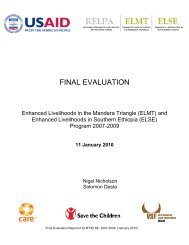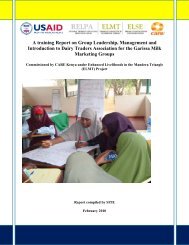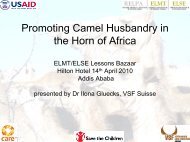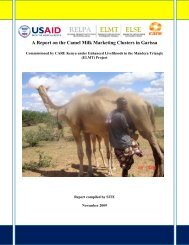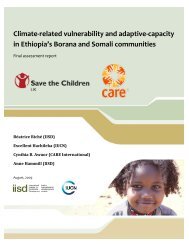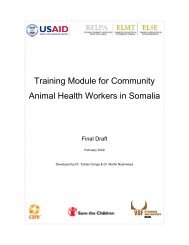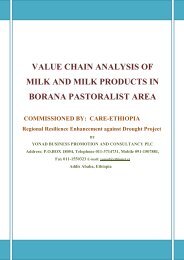care international in ethiopia – pastoral drop out study - ELMT Home
care international in ethiopia – pastoral drop out study - ELMT Home
care international in ethiopia – pastoral drop out study - ELMT Home
Create successful ePaper yourself
Turn your PDF publications into a flip-book with our unique Google optimized e-Paper software.
Livestock is the ma<strong>in</strong> asset and one of the pillars to pursue <strong>pastoral</strong> livelihood. People can’t<br />
survive as <strong>pastoral</strong>ist with<strong>out</strong> livestock. Types of livelihood strategies (or activity or<br />
comb<strong>in</strong>ation of activities) pursued determ<strong>in</strong>e the ability of <strong>in</strong>dividuals or households to<br />
achieve positive <strong>out</strong>comes such as improved wellbe<strong>in</strong>g and reduced vulnerability (Moser<br />
1998; Scoones 1998). Pastoralists, to be able to achieve positive livelihood <strong>out</strong>come, they are<br />
expected to keep, breed and manage their livestock properly, i.e., water<strong>in</strong>g, feed<strong>in</strong>g, mov<strong>in</strong>g<br />
them from place to place <strong>in</strong> search of better graz<strong>in</strong>g environment, <strong>in</strong>clud<strong>in</strong>g migrat<strong>in</strong>g with<br />
them to a distant area when the need arises. Pastoralist should have the skill and knowledge<br />
to take good <strong>care</strong> of the natural resource base on which the livestock depend on <strong>in</strong> order to<br />
reproduce and provide livelihood to people. However, peoples’ livelihoods do not always<br />
result <strong>in</strong> positive <strong>out</strong>comes and this is particularly so <strong>in</strong> the case of the poor who have<br />
limited access to various assets and whose livelihood strategies may result <strong>in</strong> further<br />
impoverishment and vulnerability (Rakodi 2002). This is the case for most <strong>pastoral</strong> <strong>drop</strong><strong>out</strong>s<br />
who are driven <strong>out</strong> of the <strong>pastoral</strong> livelihood system because of loss of their livestock and<br />
engage <strong>in</strong> environmentally destructive, low <strong>in</strong>come generat<strong>in</strong>g, and socially disgraceful<br />
livelihood strategies to make a liv<strong>in</strong>g. It is not always true to say it is the <strong>in</strong>dividuals’ efforts<br />
only that determ<strong>in</strong>e livelihood <strong>out</strong>comes. Institutional processes, such as market and political<br />
processes, at local, regional and national can scales shape livelihood <strong>out</strong>comes.<br />
Migration and the susta<strong>in</strong>able livelihood framework<br />
In the susta<strong>in</strong>able livelihood framework, migration is often considered as a key element <strong>in</strong><br />
livelihood strategies adopted by rural households for survival and accumulation motives.<br />
People often migrate to improve personal and economic circumstances for themselves and<br />
their families. While the reasons for migration are many and varied, a key factor for many is<br />
to ga<strong>in</strong> better livelihoods. Frank Ellis (Ellis, 2000) identifies different types of migration<br />
strategies adopted by rural households <strong>in</strong> develop<strong>in</strong>g countries. The first is seasonal migration,<br />
which refers to a condition where households decide to partly allocate their labor to off-farm<br />
(or non-<strong>pastoral</strong>) activities for supplementary earn<strong>in</strong>gs dur<strong>in</strong>g slack seasons <strong>in</strong> their major<br />
occupations. In this case, the migrant household member(s) may leave the rural village <strong>in</strong><br />
time of low on-farm (or <strong>pastoral</strong>) labor demand and return, with some extra<br />
10




